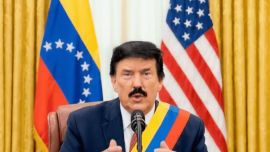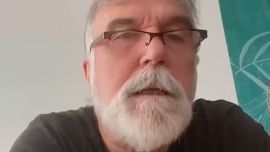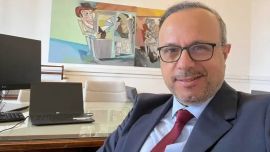President Alberto Fernández has sharply questioned the United States’ economic blockade of Cuba and Venezuela, while calling on the countries of Latin America to unite at the upcoming Summit of the Americas.
The Peronist leader, who has not yet confirmed if he will accept US President Joe Biden’s invitation to attend the event in Los Angeles next month, said he would no longer “be silent” and that the counties of the Americas should be “ashamed” by trade embargoes on the two authoritarian nations.
"In our continent we have a country that has been economically blockaded for six decades and survives as best it can; we should be very ashamed that this is happening," said the president, referring to US rules that prevent Cuba from trading with certain countries.
"We also have a country that has been blocked for five years because of a political dispute,” he continued, referenging Venezuela. “In the middle of a pandemic they blockaded it, when solidarity was more necessary than ever,” he added.
The comments were made at a Thursday summit with ministers from the Community of Latin American and Caribbean States (CELAC), which Argentina is temporarily chairing. They were delivered just hours before Fernández met with Christopher Dodd, the White House’s Special Advisor for the Summit.
Warming to his theme – and trashing his prepared remarks – Fernández implied that he would attend the June 6 to 10 summit and speak his mind.
"I won't shut up any longer, what I say here I say in the North," he declared, before going on to highlight the impact of the war in Ukraine on the nations of Latin America and the Caribbean.
"The pandemic is not over yet, we are still fighting it and the reality is that while we are fighting it, a war breaks out, again in the North and as always happens, a war breaks out in the North and we suffer it in the South,” said Fernandez.
Attendance in question
The president must soon decide whether to travel to Los Angeles for the event organised by the United States, which wants to exclude Cuba, Venezuela and Nicaragua from the meeting on democratic grounds.
Following their meeting later on Thursday, Dodd did not say if the Frente de Todos leader had given a definitive answer, though he did release a statement underlining Argentina’s potentially key role at the summit.
“In my meetings today with President Alberto Fernandez and Secretary of Strategic Affairs Gustavo Beliz, I emphasised the strength of the US relationship with Argentina, built on our shared commitment to democracy, human rights, and economic prosperity,” read a statement from the US official.
“I reiterated our hope that Argentina will be an active participant in the summit, which is especially important given its role as a regional leader,” he added, describing his hosts as “a leading voice” on democracy, climate change, economic instability and human rights.
Dodd, a former US senator, recently met with Brazilian President Jair Bolsonaro, who confirmed his attendance. The far-right leader will also hold a bilateral meeting with Biden while in Los Angeles – the first time the two leaders meet in-person.
Chile’s Gabriel Boric is expected to attend the summit, though Mexico’s Andrés Manuel López Obrador is unlikely to travel. Xiomara Castro of Honduras, Luis Arce of Bolivia and Alejandro Giammattei of Guatemala are also expected to refuse Biden’s invitation.
No invite for Venezuela
The United States said Thursday it will not invite representatives of Venezuelan President Nicolás Maduro or Nicaragua to the summit, despite Mexican-led threats to boycott if they and Cuba are excluded.
"Absolutely not. We don't recognise them as a sovereign government," Kevin O'Reilly, the coordinator of the summit, told a Senate committee this week when asked about participation of Maduro's government.
Maduro, whose 2018 re-election was widely criticised by international observers, is considered illegitimate by Washington, which recognised opposition leader Juan Guaidó as interim president under former US president Donald Trump.
Addressing the potential participation of Nicaraguan President Daniel Ortega, who has likewise been accused of increasing authoritarianism, O'Reilly also gave a definitive "no."
He gave a less clear answer when asked if Cuban government representatives would attend, saying that the White House was in charge but no invitation had been sent "to my knowledge."
Biden wants the Summit of the Americas to showcase democracy in Latin America and to step up cooperation on migration, a key political priority for the United States.
But a number of the region’s leaders, especially Mexican President Andrés Manuel López Obrador, have threatened to boycott the summit if the United States does not invite all countries. After López Obrador, the leaders of Argentina, Bolivia, Honduras and the 14-nation bloc of Caribbean states have also put their attendance in doubt, while Chile has joined calls for the widest possible participation.
Senator Marco Rubio, a Republican and vociferous critic of Latin American leftists, urged the Biden administration not to give in to Mexican demands to "invite this trifecta of tyranny."
“I don't think the United States of America should, frankly, be bullied or pressured into who to invite to a summit we're hosting," Rubio said at the hearing.
— TIMES/AFP/NA
























Comments